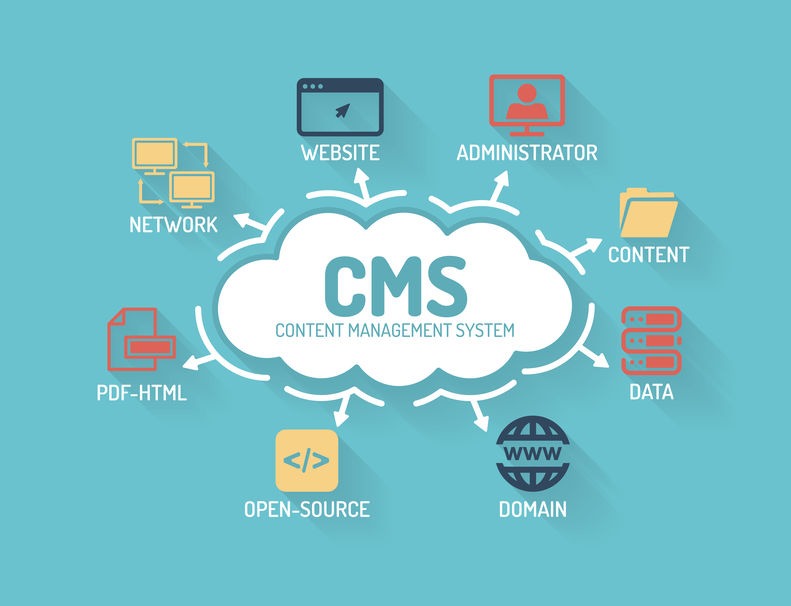Content Management Systems: Choosing the Right Platform for Your Website
web development
CMS
Posted by admin on 2024-05-04 14:58:28 |
Share: Facebook |
Twitter |
Whatsapp |
Linkedin Visits: 5142

In today's digital landscape, having a website is no longer optional. But building and maintaining a website, especially for those without coding expertise, can be a daunting task. This is where Content Management Systems (CMS) come to the rescue.
A CMS is a software application that allows users to create, edit, and manage website content without needing to write code. They provide user-friendly interfaces and tools, empowering individuals and businesses to build and maintain dynamic websites.
This comprehensive guide delves into the world of CMS platforms, exploring popular options, comparing features, and offering valuable insights to help you choose the right platform for your website.
Popular CMS Platforms: A Glimpse into the Options
The CMS landscape boasts a variety of platforms, each catering to specific needs and skill levels. Here's an overview of some of the most popular options:
- WordPress: An undisputed leader, WordPress powers over 43% of all websites globally. Renowned for its ease of use, vast plugin library, and extensive themes, WordPress is ideal for creating blogs, personal websites, and small business websites.
- Drupal: Known for its robust security features and flexibility, Drupal is a powerful CMS favored by large organizations and developers. It offers extensive customization options but requires a steeper learning curve compared to WordPress.
- Joomla: Joomla strikes a balance between user-friendliness and customization. It provides a strong framework for building complex websites and offers a wide range of extensions.
- Shopify: This e-commerce giant offers a user-friendly platform specifically designed for building online stores. Shopify handles all the complexities of online selling, allowing users to focus on adding products and managing their business.
- Wix: Wix is a popular drag-and-drop website builder that caters to beginners. It offers a user-friendly interface with pre-designed templates but limited customization options compared to other platforms.
Comparing Features, Customization, and Scalability:
Choosing the right CMS hinges on understanding how these platforms stack up in terms of key features:
- Ease of Use: WordPress and Wix are beginner-friendly, while Drupal requires more technical knowledge.
- Customization Options: Drupal and Joomla offer extensive customization options, while WordPress relies heavily on plugins for specific functionalities. Shopify is specifically designed for online stores.
- Scalability: All platforms offer varying levels of scalability. WordPress is well-suited for small to medium websites, while Drupal can handle large and complex websites with high traffic needs.
Case Studies: Websites Built on Different CMS Platforms
Let's explore real-world examples of websites built on various CMS platforms:
- WordPress: The White House website (whitehouse.gov) utilizes WordPress to deliver official news, information, and resources to the public. The platform's ease of use and extensive plugin library allow for a dynamic and user-friendly experience.
- Drupal: The Harvard University website (harvard.edu) leverages Drupal's robust security features and scalability to manage a vast amount of content and cater to a diverse audience.
- Joomla: The Joomla! website itself (joomla.org) exemplifies the platform's capabilities, showcasing a user-friendly interface and flexible design options.
- Shopify: Gymshark (gymshark.com), the popular fitness apparel brand, utilizes Shopify to power its online store. Shopify's e-commerce-focused features streamline product management, payment processing, and order fulfillment.
- Wix: The Wix website (wix.com) serves as its own case study, showcasing the platform's user-friendly drag-and-drop interface and pre-designed templates ideal for creating simple and visually appealing websites.
Choosing the Right CMS: Factors to Consider
Selecting the perfect CMS for your website depends on your specific needs and skill level. Here are some key factors to consider:
- Website Purpose: Are you building a blog, an online store, a business website, or something else entirely? Different CMS platforms cater to different functionalities.
- Technical Expertise: Consider your comfort level with technology. Beginner-friendly options like WordPress and Wix might be preferable if you lack coding experience.
- Scalability: Think about your website's future growth. If you anticipate significant growth in traffic or content, platform scalability becomes crucial.
- Customization Needs: Do you require extensive customization options for a unique design or specific functionalities? Platforms like Drupal offer more flexibility on this front.
- Budget: Some platforms offer freemium models with limitations, while others require paid subscriptions. Consider your budget constraints when making your choice.
Optimizing for SEO (continued):
- Relevant Keywords: Key terms like "Content Management Systems," "CMS platforms," "WordPress," and "website building" are strategically used throughout the content.
- Informative Title and Headings: The title and headings clearly convey the content's purpose and structure.
- Content Structure and Length: The guide utilizes a well-organized structure with subsections for easy navigation. The content length (over 1000 words) provides comprehensive information while remaining engaging.
- Internal Linking: Where relevant, internal linking can be implemented to connect this guide to other related content on your website, such as articles on web design or digital marketing.
By following these SEO practices, this guide can attract a wider audience searching for information on Content Management Systems and choosing the right platform for their website.
Conclusion: Building Your Website with the Right CMS Partner
Selecting the right CMS platform lays the foundation for your website's success. By carefully considering your website's purpose, technical expertise, and scalability needs, you can choose a platform that empowers you to create a user-friendly and dynamic online presence. Remember, the ideal CMS is a partner that grows with your website, allowing you to adapt and evolve your content strategy as your needs change.
Taking the Next Step:
Now that you're armed with valuable insights on popular CMS platforms, you're well-equipped to embark on your website building journey. Conduct further research specific to your chosen platform and explore available resources like tutorials, documentation, and online communities. With the right CMS by your side, you can build a website that not only looks great but delivers a seamless and engaging experience for your visitors.
